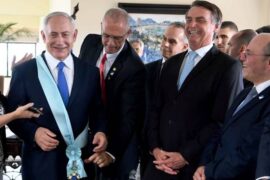According to former White House senior advisor and “first son-in-law” Jared Kushner’s tell-all book, Breaking History: A White House Memoir (set to be published later this month), US President Donald Trump threatened to allow international sanctions against the State of Israel if Prime Minister Binyamin Netanyahu (Likud) were to unilaterally annex parts of the West Bank.
“With annexation, Bibi risked near-unanimous condemnation at the United Nations,” Kushner wrote of the efforts to convince Netanyahu to surrender territory as outlined in Trump’s “Deal of the Century” along with extending sovereignty to parts of the Samaria and Judea regions.
“And if he went forward unilaterally, there was no guarantee that our administration would block the international sanctions against Israel that might follow.”
In January 2020, when Netanyahu arrived in Washington for the rollout of Trump’s plan, he implied that the president had given him a green light for applying Israeli sovereignty to parts of the West Bank. But according to Kushner’s account, this had not been agreed upon with Trump administration officials.
“This was a step too far,” Kushner writes in his book.
“I grabbed my chair so intensely that my knuckles turned white, as if my grip could make Bibi stop.”
According to Kushner’s account, Trump was equally enraged.
“Bibi gave a campaign speech. I feel dirty,” he told his son-in-law after the event, saying that he was contemplating endorsing Benny Gantz (Blue & White), the prime minister’s main political rival at the time.
Kushner’s book confirms that the relationship between the Trump administration and Jerusalem deteriorated after that episode, as was later reported by Israeli journalist Barak Ravid.
“Behind the scenes, our relationship with the Israeli government had reached its lowest point to date,” Kushner writes.
According to Kushner, tensions between the Trump administration and Netanyahu over the annexation issue continued in the ensuing months as the Trump team unsuccessfully sought to extract greater concessions from Netanyahu.
In June 2020, Israeli and American teams had negotiated a detailed map of where Israel would officially apply sovereignty to roughly 30% of the West Bank.
US Ambassador to Israel Friedman sought former president Donald Trump’s approval to proceed, while Kushner saw that Netanyahu was not prepared to make sufficient concessions.
Due to the inability of the administration to coerce Netanyahu to cooperate with Trump’s two-state plan, the plan was ultimately scrapped and replaced with the Abraham Accords to help all parties save face. But it should be noted that Netanyahu, for all his many faults, successfully defended Israel from Trump’s two-state agenda.
In the years leading up to the publication of Trump’s plan, Vision Magazine had often asserted that it would be a program aimed at dividing our country into two separate states. In the months following its unveiling, we called for it to be resisted in its entirety and pushed back against rightist claims that Israel could annex 30% of the West Bank while ignoring the parts of Trump’s plan that called for Israel to surrender the remaining 70.
Despite what we pointed to as obvious signs that the Trump administration would attempt to force Jerusalem into accepting partition, Trump’s team was successful at neutralizing most of the Israeli and Diaspora Jewish figures who would oppose such a plan under normal circumstances.
David Friedman seduced the Israeli national camp and its Diaspora supporters, deceptively granting them access and a proximity to power they had never before experienced. Because most Jewish nationalists lack the geo-political awareness to understand US interests or how imperialism actually operates, they were easy to manipulate and reassure in their moments of doubt.
Most ridiculous of all were the voices – including that of Naftali Bennett (Yamina) – claiming that it was Netanyahu who decided against annexing parts of the Samaria and Judea regions despite a supposed green light from Trump. Kushner’s book, together with the revelations provided by Barak Ravid’s interviews last December, should (but probably won’t) serve to silence these voices in the future. The complete ignorance for the role US interests and demands play in Israel’s major policy decisions is arguably the Israeli national camp’s greatest strategic weakness.
Donald Trump’s stated preference for Benny Gantz also lends credibility to claims by Vision Magazine that Trump had wanted Blue & White in the coalition and that he interfered in Israel’s internal politics through Avigdor Lieberman (Yisrael Beiteinu) to ensure Netanyahu would not be able to form a government without Gantz. If true, this would make Trump primarily responsible for the political instability that plagued Israel in recent years and ultimately led to Netanyahu’s removal from office.
Trump wasn’t the great friend to Israel that so many rightist Jews wanted to believe him to be. His “Deal of the Century” essentially repackaged the same partition plan Washington has been trying to impose on our country since the Six Day War. But the fact that Trump succeeded in manipulating and neutralizing Israel’s nationalist opposition to his plan should alert us to the fact that loyalty to the homeland and Jewish national consciousness – no matter how deep – aren’t enough to resist efforts to divide our land if not combined with a principled materialist understanding of imperialism and geo-politics.
What’s clear moving forward is that Israel needs to remove itself from the orbit of the United States, not only because the empire appears to be in rapid decline but also because the Jewish people didn’t come back to life after 2,000 years merely to serve as an outpost of US imperial power.
A responsible and capable Israeli leadership would act independently of the United States and unilaterally apply sovereignty over all the territory between the river and the sea – but would do so in such a way that’s just for all peoples here and doesn’t offer foreign governments any moral justification to intervene.





